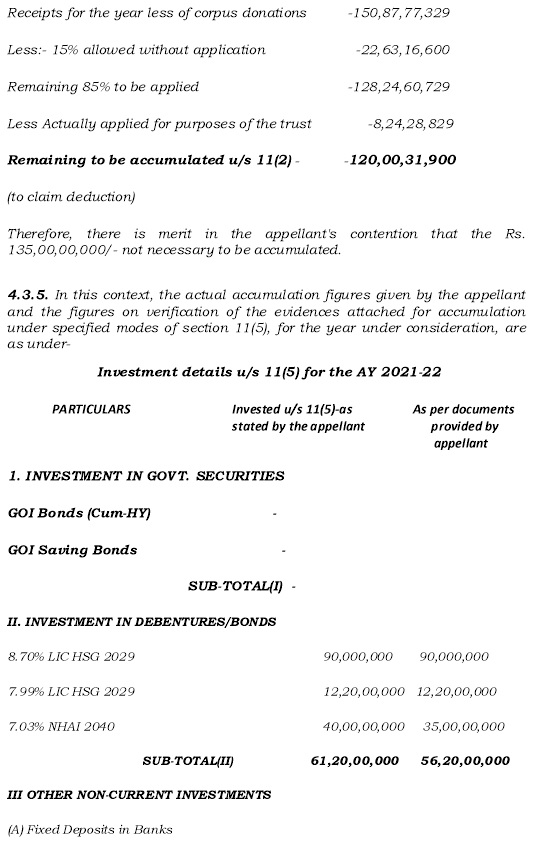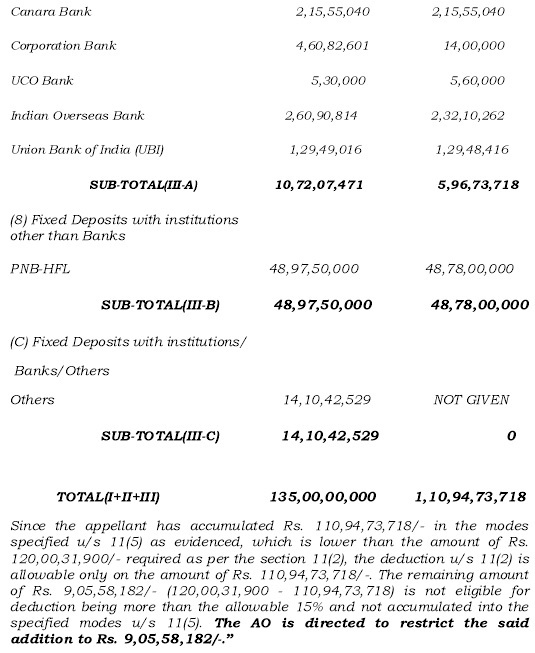Case Law Details
Institute of Company Secretaries of India Vs DCIT (ITAT Delhi)
Introduction: The Institute of Company Secretaries of India (ICSI) found itself in a legal tussle with the Deputy Commissioner of Income Tax (DCIT) in a case brought before the Income Tax Appellate Tribunal (ITAT) in Delhi. The crux of the matter revolved around ICSI’s claim for income tax exemption, which was contested by the tax authorities. The ITAT recently rendered its decision, sending shockwaves through both camps.
Detailed Analysis: The appeal filed by ICSI was a response to the order issued by the Commissioner of Income Tax (Appeals) NFAC, Delhi, concerning the assessment year 2021-22. ICSI contested various aspects of the order, including the partial sustenance of the Assessing Officer’s decision by the CIT(A). The crux of their argument lay in the discrepancy between the claimed amount under section 11(2) of the Income Tax Act and the actual allowance made by the tax authorities.
Despite ICSI’s efforts to justify their claim, the Ld. CIT(A) and the Centralized Processing Center, Income Tax Department, remained unconvinced, leading to a denial of part of the claimed exemption. The matter escalated as ICSI sought redress through the appellate process, culminating in the ITAT’s intervention.
The ITAT’s decision to restore the matter back to the Assessing Officer for further verification underscores the complexity and importance of the case. While acknowledging the need for judicial scrutiny, the tribunal refrained from making a definitive ruling, opting instead for a comprehensive reassessment of the facts and legalities involved.
Conclusion: The ITAT’s ruling in the Institute of Company Secretaries of India vs. DCIT case highlights the meticulous nature of tax assessments and the significance of due process. As both parties brace for further deliberations, the outcome of this legal saga will undoubtedly shape future interpretations of tax laws and exemptions. Stay tuned as the saga unfolds, with implications that extend far beyond the confines of this specific dispute.
FULL TEXT OF THE ORDER OF ITAT DELHI
The appeal filed by the assessee is directed against the order dated 27.09.2023 of the Ld. Commissioner of Income Tax (Appeals) NFAC, Delhi (“CIT(A)”) pertaining to Assessment Year (“AY”) 2021- 22.
2. The assessee has raised the following grounds of appeal:-
“1. That the Order of learned CIT (A), NFAC partly sustaining the order of the learned Assessing Officer is bad in law and on facts and is liable to be set- aside.
2. That the learned CIT (A), NFAC has erred in law and on facts in only partly allowing the claim made u/s 11(2) of the Income Tax Act, 1961 amounting to Rs. 110,94,73,718/- as against 120,00,33,672/-claimed in ITR form.
3. That the learned CIT (A), NFAC has erred in law and on facts in not giving the benefit of balance claim of Rs.9,05,58, 182/- on account of non- accumulation of funds u/s 11(5) of the Act, though evidences were furnished with the learned CIT(A).
4. That order passed by learned CIT (A), NFAC is against the principles of natural justice as no clarification was sought for any discrepancy found while matching the details of investment with evidence furnished.
5. That the disallowance made u/s 11(2) by Centralized Processing Center, Income Tax Department and by learned CIT(A), NFAC was outside the purview of section 154 r.w.s.143(1) of the Income Tax Act, 1961.
6. That the learned CIT(A) as well as Centralized Processing Center, Income Tax Department has failed to appreciate that the assessee had duly complied with provisions of 11(2) as Form 10 was e-filed before the specified due date.
7. On the facts and circumstances of the case, the issue before the learned CIT(A) is regarding the allowance of exemption claimed u/s 11(2) which CPC, Income Tax Department has disallowed on the ground that amount entered at Sl. No. 4vi of Part B-TI (Rs. 1,20,00,33,672/-) is not equal to amount mentioned at Sl. No. 1 of Form 10 (Rs. 1,35,00,00,000/-) and further, stated that hence exemption claimed for accumulation is allowable to the extent of amount entered in Form. However, amount considered by Centralized Processing Center as Rs. 0 adjacent to Error Description under the head As Computed contradicting its own statement.”
3. The brief facts as narrated by the Ld. CIT(A) are as under:-
“1.2. The appellant filed ROI on 11.03.2022 declaring a total income of Rs. Nil and claimed refund of Rs. 1,68,51,181/- after claiming exemption u/s. 11(2) for an amount of Rs. 120,00,33,672/-. At the time of issuing intimation u/s 143(1) dated 14/12/2022, the CPC, Bengaluru had given less credit of TDS by Rs. 72,55,653/- and accordingly. refund of Rs. 95,95.528/- had been determined as against refund of Rs. 1.68,51,181/- claimed in ITR. In response to above said intimation issued u/s 143(1), a rectification application u/s 154 was e-filed by the appellant on 20/12/2022 stating “Correction of details of Pre-paid Taxes”. Thereafter, an order was passed u/s 154 of the IT Act by CPC, Bangalore dated 12/01/2023 wherein CPC had not given the credit of balance TDS but this time demand was raised for Rs. 64,47,35,040/- on account of disallowing the claim made u/s 11(2) of the Income Tax Act, 1961 amounting to Rs. 1,20,00,33,672/-.
1.3. Against the above said rectification order passed u/s 154 of the IT Act dated 12/01/2023, the appellant had again e-filed rectification application u/s 154 of the I T Act, 1961 on 13/01/2023 to reprocess the case. In response to the above said application, a rectification order u/s 154/143(1) was passed by CPC, Bangalore on 24/01/2023 wherein the department had given full credit of TDS as was claimed in ITR form i.e. Rs. 1,68,51,181/-, however the benefit of exemption claimed u/s 11(2) of the Act amounting to Rs. 1,20,00,33,672/- was not given and accordingly, demand of Rs. 63,55,89,270/- has been raised by CPC.”
4. Aggrieved by the denial of benefit of exemption claimed under section 11(2) of the Income Tax Act, 1961 (the “Act”) amounting to Rs. 1,20,00,33,672/- in rectification order under section 154/143(1) dated 24.01.2023 passed by CPC Bangalore, the assessee filed appeal before the Ld. CIT(A).
5. The assessee made submission which is reproduced by the Ld. CIT(A) in para 4.2 of his appellate order. During appeal proceedings the Ld. CIT(A) required the assessee to explain why there was a difference in figures in computation of income in return of income and in Form 10 in respect of total amount of accumulated funds under section 11(2) for the AY 2021-22. The assessee submitted reply which is reproduced by the Ld. CIT(A) at page 11-12 of the appeal The Ld. CIT(A) recorded his observation and findings in para 4.3.4 and 4.3.5 which is reproduced hereunder:-
“4.3.4. In this regard, it is seen that the appellant is stating that the resolution is passed for accumulation of Rs. 135,00,00,000/- whereas required accumulation is only Rs. 120,00,33672/-. In this respect, the figures are verified and calculation for required accumulation is as under:-


6. Thus, the Ld. CIT(A) partly allowed the assessee’s claim under section 11(2) of the Act amounting to Rs. 110,94,73,718/- as against Rs. 120,00,33,672/- claimed in the return. It is against the denial of benefit of balance claim of Rs. 9,05,58,182/- on account of non-accumulation of funds under section 11(5) of the Act, that the assessee is in appeal before the Tribunal and all the grounds of appeal relate thereto.
7. The Ld. AR submitted that the assessee is registered under section 12A of the Act. It e-filed rectification application under section 154 after receipt of intimation under section 143(1)(a) of the Act. However, in order under section 154 dated 20.01.2023 passed by CPC Bangalore the assessee’s claim made under section 11(2) of the Act amounting to Rs. 1,20,00,33,672/- which was in original intimation under section 143(1) dated 14.12.2022 was allowed, was denied. He drew our attention to page 15, 18, 31, 35 and 52 of the Paper Book in support of the above contention. The Ld. AR further submitted that the assessee, despite having reservation about it, submitted all documents pertaining to investments under section 11(5) of the Act before the Ld. CIT(A) on being asked and referred to pages 60-65 of the Paper Book. It is his contention that the Ld. CIT(A) did not ask for clarification from the assessee for alleged discrepancy found by him while matching the details of investment with evidence furnished. This is in violation of the principles of natural justice. The Ld. AR asserted that the CPC Bangalore as also the Ld. CIT(A) did not appreciate that the assessee had duly complied with the provisions of section 11(2) as Form 10 was e-filed before the specified due date.
8. The Ld. CIT-DR supported the order of the Ld. CIT(A).
9. We have carefully considered the submission of the Ld. Representative of the parties and perused the record. In our view, the claim of the assessee needs verification. We, therefore, consider it judicially expedient to restore the matter back to the file of the Ld. AO to carry out necessary verification of the assessee’s claim and if on verification, the claim of the assessee is found to be correct and in accordance with law, modify the assessment. We order accordingly.
10. In the result, the appeal of the assessee is treated as allowed for statistical purposes.
Order pronounced in the open court on 27th March, 2024.





